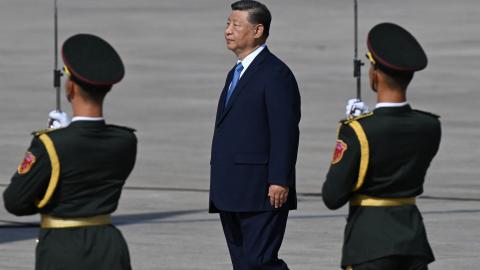The belief that arduous negotiations with Beijing, expecting China to follow the gospel of markets and respect for the rule of law would coax the communist nation into democratic capitalism was always an illusion.
Three decades of engagement have proved it false. China has not converged with the U.S.-led postwar order; it has collided with it. The collision is structural, ideological and irreconcilable. We must be clear: Peaceful coexistence with the Chinese Communist Party is not unlikely. It is impossible.
History shows why. In the 1930s, Western leaders believed negotiations and concessions would temper Adolf Hitler. Munich did not prevent war; it hastened it. In 1939, Josef Stalin joined Hitler in the Molotov-Ribbentrop Pact, proving totalitarian regimes will cooperate against liberal systems whenever it suits them.
During the Cold War, detente was supposed to stabilize relations with Moscow, even as the Soviet Union repressed its people and expanded abroad even more. In each case, illusions of coexistence ended in confrontation.
China today is no exception.
The incompatibility begins with China’s closed society in a world order built on openness and reciprocity. Nearly 300,000 Chinese study in America each year, but fewer than 1,000 American students are in China.
For every American student in China, nearly 3,000 Chinese study in the U.S. This imbalance is deliberate. The CCP drains knowledge from abroad but blocks reciprocity through surveillance, censorship and regulation.
The digital divide is even sharper. Americans can download TikTok, a Chinese app whose data practices raise national security alarms. Yet the CCP makes all American social media platforms — including Facebook, Twitter, YouTube, Instagram, Gmail, LinkedIn and Google — unavailable to the Chinese people.
Behind the Great Firewall, Chinese citizens live in a sealed world where propaganda dominates. Hundreds of millions believe COVID-19 began not in Wuhan but in a U.S. Army lab in Maryland. This is not a misunderstanding; it is indoctrination. A regime built on lies at home will not deal honestly abroad.
Commerce reveals the same futility. Chinese firms buy American assets freely, while U.S. firms can’t do the same and face endless barriers in China. Reciprocity, the bedrock of fair exchange, is absent. Beijing’s aim is not mutual prosperity but asymmetric gain. Hoping patience will change this is as naive as trusting Hitler’s pledges or Leonid Brezhnev’s promises.
China’s economy is equally irreconcilable with the liberal order. The CCP demands recognition as a market economy while practicing the opposite. It manipulates currency, channels subsidies to state-backed sectors and directs capital by political decree.
State-owned enterprises dominate, while non-state firms survive only at the party’s mercy. Jack Ma’s rise and fall proved that wealth in China is provisional, not protected.
Abroad, Chinese companies do not compete. They distort, undercut and weaponize commerce for Beijing’s strategic ends.
This is not capitalism. It is authoritarian mercantilism designed to hollow out competitors while insulating the regime. To pretend such a system can coexist with global markets is to indulge the same fantasy that underpinned detente: that authoritarian powers can be integrated into a liberal order without undermining it. They cannot.
At its core, China remains a communist dictatorship. The party is supreme; property rights do not exist; courts enforce communist authority, not law. Foreign companies are forced to hand over technology, endure surveillance and risk theft of intellectual property. Engagement under such conditions is not partnership; it is extortion, and extortion cannot sustain coexistence.
Nor are Beijing’s ambitions confined within its borders. The Belt and Road Initiative is not development but leverage. Loans create dependence; dependence breeds obedience. Ports, power plants and railways are not neutral assets but instruments of control.
Simultaneously, China militarizes the South China Sea, threatens Taiwan and bankrolls Russia’s war in Ukraine. These are not the behaviors of a state seeking stability. They are the actions of a power bent on rewriting the global order.
The clash is unavoidable. The West rests on openness, reciprocity and the rule of law. The CCP rests on secrecy, coercion and party supremacy.
These are not policy differences that need to be managed. They are contradictions of principle, and contradictions cannot be reconciled. To believe otherwise is to risk repeating Munich or the delusions of detente.
That is why nations across the Indo-Pacific — Japan, India, Australia, the Philippines — are rallying through the Quad, AUKUS and other alliances. They understand that coexistence with the CCP is a fantasy, and fantasies cannot defend freedom.
America has faced this before. In 1900, the McKinley administration’s Open Door Policy insisted that China’s markets be open and rules fair.
That principle was not only economic but also moral. It rejected monopoly and coercion.
President Trump’s insistence on “opening up China” was no break from tradition; it was the reaffirmation of America’s century-old refusal to accept exploitation as the price of engagement.
The time for illusions is over. China is not a partner waiting for persuasion. It is a closed society, a non-market economy, a communist dictatorship with global ambitions. Its system makes coexistence not difficult but impossible.
The choice is stark: China either accepts the principles of openness and reciprocity or remains outside the order it seeks to subvert.
History has already taught us this lesson. We cannot afford to relearn it the hard way.

















